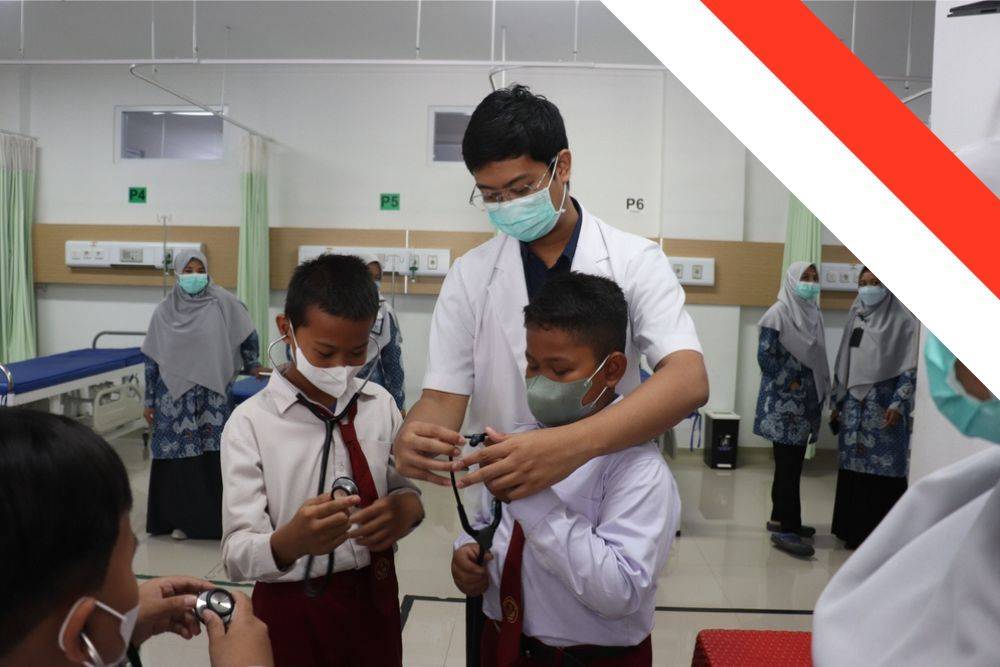Paediatric cancer detection and treatment in Indonesia continue to be plagued with many challenges.
Although parents’ awareness of the dangers of paediatric cancer is increasing, cancer treatment in Indonesia is far from perfect.
Uneven Distribution of Paediatric Oncology Doctors
The distribution of paediatric oncology doctors in Indonesia is uneven. This is a significant obstacle in paediatric cancer treatment. Facilities and health workers in Eastern Indonesia are still very minimal, which can endanger paediatric cancer patients who need fast treatment. “The distribution of paediatric oncologists is uneven in Indonesia. You have to go by plane first, go this way, go that way,” said Dr Anky Tri Rini Kusumaning Edhy, SpAK.
The number of paediatric cancer (oncology) consultant doctors in Indonesia reached around 62 people recorded in 2023, spread across 25 provinces. However, this distribution is very uneven. Most of these doctors are located in the western part of Indonesia, while in the central part, there are very few, and in the eastern part, there are none. This condition causes paediatric cancer patients’ access to medical services to be very limited. In addition, not all hospitals in Indonesia have complete cancer treatment facilities, further narrowing the opportunity for paediatric cancer patients to get optimal treatment.
The government’s Role is Necessary
Dr Anky hopes the government, especially the Ministry of Health, can step in to improve the detection and treatment of childhood cancer across Indonesia. According to her, the problem of childhood cancer is very complex and requires help from various parties, including the government. “The problem of childhood cancer is very complex and requires a lot of help from various parties, one of which is the government,” she said.
Geographical Challenges and Medical Staff Distribution
The paediatric cancer treatment process in Indonesia is affected by geographical challenges. Indonesia is so vast that the number of cancer specialists is still insufficient and the distribution is uneven. “Medical personnel who are experts in cancer are still concentrated in Java, Bali, and parts of Sumatra,” explained Dr Anky.
Government and Community Cooperation
Dr Anky emphasises the importance of cooperation between the government and the community in dealing with childhood cancer. A late diagnosis can be very dangerous for the child. “In this case, the government cannot give up. There must be co-operation. It is very dangerous if the diagnosis is late,” she emphasised.
Public Education and Understanding
In addition to the problem of medical personnel and health infrastructure, education and public understanding of childhood cancer is also a big task. Prof Dr Aru W Sudoyo, SpPD-KHOM, Chairman of YKI, stated that there are still many stigmas and myths about cancer in society.
Cancer Myths and Stigma
Some myths can hinder the cancer treatment process—for example, myths about alternative treatments and biopsies that are considered to worsen health conditions. “For example, it is said that if a lump is biopsied, it will become malignant and spread, so people don’t want a biopsy. They end up coming late to the hospital, which is very common,” says Prof Aru.
Another myth is that many people believe that alternative treatments are more effective than medical treatments. This myth often leads to patients not getting the right treatment. As a result, cancer diagnosis is often late and the patient’s condition worsens before getting the appropriate treatment.
Another myth is that childhood cancer can be passed from one child to another. This is not true and can lead parents and the community to think that children with cancer should be isolated. This view can limit a child with cancer’s access to the appropriate treatment and social support they need.
There is also an assumption that childhood cancer survivors will always carry the stigma of cancer. This myth states that they will be belittled or discriminated against in their lives. This view can make paediatric cancer survivors feel uncomfortable sharing their story. In fact, sharing their experiences can help break stigma and discrimination.
The Importance of Education
Prof Aru emphasised that education is crucial to dispel false myths and raise public awareness about the importance of early detection and treatment of cancer. “There is also the myth that cancer treatment makes cancer worse. Education is very important,” he emphasised. As a result, many people are reluctant to have the necessary screening or treatment, resulting in late diagnosis. With proper education, the public can better understand paediatric cancer and the importance of early detection and appropriate treatment. This will also help improve paediatric cancer patients’ access to appropriate treatment and support them in their fight against the disease.
The Important Role of Collaboration and Education
The challenges in paediatric cancer care in Indonesia are complex. Issues of medical personnel distribution, health infrastructure, and public education and understanding need serious attention. Cooperation between the government and the community is essential to improve the quality of childhood cancer detection and treatment. Proper education can help dispel false myths and raise awareness about the importance of early childhood cancer treatment.
Have a pressing question for a doctor? Medical Channel Asia has launched a community forum page where you can get questions answered by a medical specialist. Visit the community forum here.

